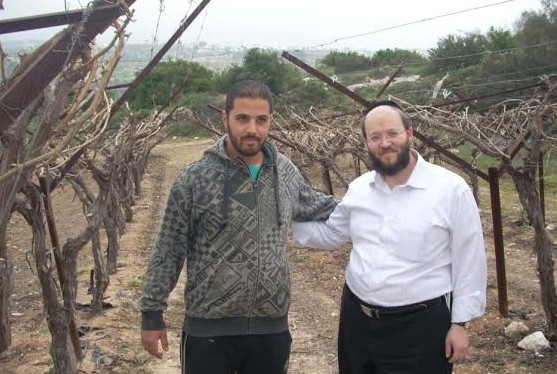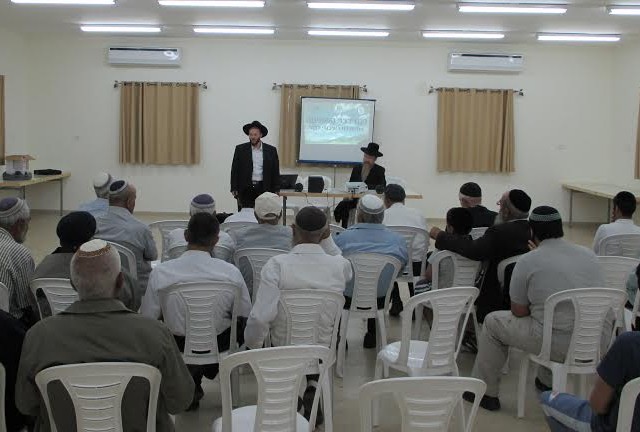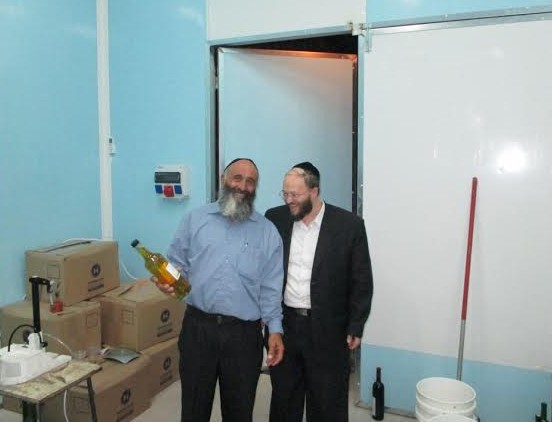Heartwarming Initiative: Farmers Learning Shemitah Laws Together
With the Shemitah year approaching, a touching new initiative reveals that over 500 farmers are learning the laws of Shemitah through a unique phone partnership program. Learn how the government both supports and hinders Shemitah observance, and why it represents true sacrifice from farmers.

Several years ago, Rabbi Menachem Mendel Mendelson, son of the late Rabbi Binyamin Mendelson of Komemiyut, decided to take up the challenge of Shemitah and try to organize a thorough study program for farmers on the subject. Over time, it became clear that Rabbi Mendelson had already foreseen the current situation, which presents rather discouraging facts: few farmers truly understand the mitzvah of Shemitah properly.
To advance his idea at the time, the Rabbi approached a unique organization called "Ayelet HaShachar" led by Rabbi Shlomo Raanan - which aims to promote telephone Torah study in pairs, through a "chavruta" system. Rabbi Mendelson proposed the idea, and it was enthusiastically accepted. Since then, sadly, Rabbi Mendelson passed away about four years ago, but the project he initiated continues to operate at full strength. Especially in recent months, as we approach the Shemitah year - more and more farmers are seriously studying the subject in order to observe it properly. Hundreds of them are, as mentioned, being introduced to this topic for the very first time.
 Gili Machluf in a vineyard at Moshav Shekef
Gili Machluf in a vineyard at Moshav Shekef
Furthermore, in order to expand the project's scope, reach new audiences and expose them to the importance of the Shemitah mitzvah - the chavruta activities have accelerated in the past two years. Additional topics related to land-dependent mitzvot have been incorporated into the study material, such as: mixed species, tithes and offerings, orlah, and other subjects. For this important project, many yeshiva students and scholars throughout Israel have been trained to serve as study partners for various farmers and learn the relevant laws together with them.
Raphael Krasnitzky is one of them.
Krasnitzky, 35, who began his work with the Ayelet HaShachar's chavruta project about eight years ago, is a scholar at the Mir Kollel in Modi'in Illit, and he is responsible for halachic guidance in studying the material (to maximize its benefit) as well as the general management of the Shemitah project. "Like all people, we're very busy with daily life," he explains, "and sometimes the scheduled conversations between study partners don't actually take place. My role is to be the connecting link between the scholar and the farmer, ensuring that their conversations happen in practice. Besides that, we also try to attend conferences that the organization holds in nearly one hundred settlements throughout Israel, assist with the telephone hotline, and work as much as possible with various kashrut agencies - with the goal of expanding the circle of Shemitah observers."
"Farmers have learned: 'It is not in heaven'"
What percentage of farmers are showing interest and actually responding?
"It turns out that there's quite a high percentage of interest, with hopes to double or triple it once farmers understand that it's easy to implement. Some farmers worry that studying the laws of the seventh year is a complicated set of rules difficult to apply, but this is fundamentally mistaken," explains Krasnitzky. "With anything new that you learn for the first time, there's a certain difficulty to overcome, but once you get past that hurdle - everything becomes easier. Many farmers who were initially reluctant but still gave it a chance discovered that 'it is not in heaven,' and that implementation is accessible and easy for anyone who wants it and understands the importance and blessing that observing the mitzvah can bring them."
 Conference on Shemitah
Conference on Shemitah
Additionally, a unique explanatory video was produced for the project by "Ayelet HaShachar," which clearly shows the blessing in yield that farmers receive before the Shemitah year. "Every year I harvest about 46-47 bales of straw for cows and horses from my field. Last year, I collected 128 bales. Unbelievable, three times more," says one farmer. Yosef David, a farmer from Moshav Menucha who owns vineyards, adds: "In the seventh and eighth years, the vineyards yielded perhaps twice what they would in a normal year." Another farmer, Rafael Mor-Yosef from Moshav Sadeh Tzvi recounts: "I've observed Shemitah three times now. Each time afterward, my yield was better. Thank Hashem, both strength and livelihood improved." These stories join many others - dozens of farmers who see Hashem directly in every Shemitah they observe.
By the way, is the blessing guaranteed in every case - for a farmer who observes the Shemitah commandment?
Krasnitzky smiles. "It's moving to see the willingness of farmers to observe Shemitah and be meticulous about its laws, regardless of the Torah's promise of blessing. 'I will command My blessing for you in the sixth year' - it's written in the Torah, so certainly the blessing exists. But we don't promise anything. How can we know heaven's calculations - who deserves a blessing and who doesn't? It's explicitly explained in the Torah that there are several things that can prevent the blessing from happening. The mitzvah of Shemitah, like any other mitzvah we perform, is in the category of an effort to fulfill Hashem's command, and certainly not in order to receive a reward. Nevertheless, we witness many success stories of farmers who properly observed Shemitah and were blessed in their work."
"There's no doubt that observing Shemitah is a great test of faith"
It turns out that alongside the halachic obligation for farmers to let their fields rest, and the blessing that many of them receive as a result, there are also quite a few difficulties. These require genuine self-sacrifice and compromises in order to properly fulfill the mitzvah of Shemitah. The first of these, you can probably guess: great concern. It's not easy for a farmer to simply abandon his field and make it ownerless for an entire year, after such intensive and hard work on it in the past.
 Gili Machluf. Preparing for the Shemitah year
Gili Machluf. Preparing for the Shemitah yearAnother difficulty relates to the marketing agreements that farmers operate under: as part of this, they are obligated to supply produce even during the Shemitah year, when they cannot work the land and must make it available to everyone. Most farmers in the country work in this system, this is how they market their crops, and this is how they make a living. So what does one do, you ask? "This is a difficulty that can be overcome," says Krasnitzky, "It involves a process of negotiation, but it's possible."
In addition, it's important to know that the government also creates quite a few difficulties. A farmer who employs a foreign worker, for example, cannot reassign them from working the inactive land to other work. Anyone who wants to do this anyway will need to submit a request and receive special approval.
Another difficulty lies in the fact that there are physical preparations a farmer needs to make in his field, such as coarse pruning in vineyards and trees, and additional preparations detailed in the booklet issued by the Ministry of Agriculture. But all these are still considered minor difficulties compared to the real challenge, which might completely discourage farmers from fulfilling the mitzvah - how and from what does one earn a living if nothing is marketed during the Shemitah year?
"That's exactly why the 'Keren HaShvi'it' (Seventh Year Fund) organization was established under Rabbi Ben Zion Kugler," explains Krasnitzky. "The fund is responsible for collecting donations from various organizations to financially support farmers who observe the mitzvah during the Shemitah year. Of course, they can't always reach everyone, but the aim is to help as much as possible. The organization works around the clock, and I know of hundreds of scholars who eagerly join the effort and donate money willingly, so that farmers can hold on and observe Shemitah at all costs."
And what about the government, doesn't it help in some way?
"Actually, it does. There's a government budget of 100 million shekels allocated for Shemitah. However, most of it goes to what's called 'heter mechirah' (sale permit), which requires a lot of budget to manage. At the bottom line, what remains of all this for the farmers is about 18 million shekels. This year, a very large budget was allocated for vineyards that rest during the Shemitah year, which is good news in itself. But in order to receive government assistance, a farmer needs to keep organized records throughout the year. Besides that, it's important to know how to properly submit the request. These are issues we frequently encounter in the telephone chavruta project, and we try to answer everything and help as many farmers as possible."
In conclusion, Krasnitzky wishes to strengthen the hands of farmers who take on the mitzvah of Shemitah. "There's no doubt that observing the mitzvah of Shemitah is a great test of faith, but it's no coincidence that one of the great Torah leaders whose name I can't recall once remarked that a farmer who rests during the Shemitah year and properly observes it - when the Messiah comes, that farmer will merit to greet him with joy. This shows what a tremendous privilege it is."
Are you also interested in joining the telephone chavruta project of the Ayelet HaShachar organization, and learning the various laws of Shemitah? You can contact them at 073-232-2229

